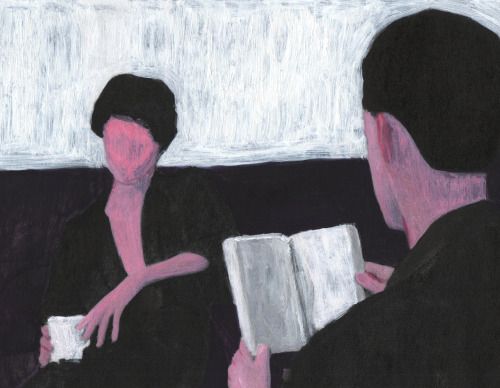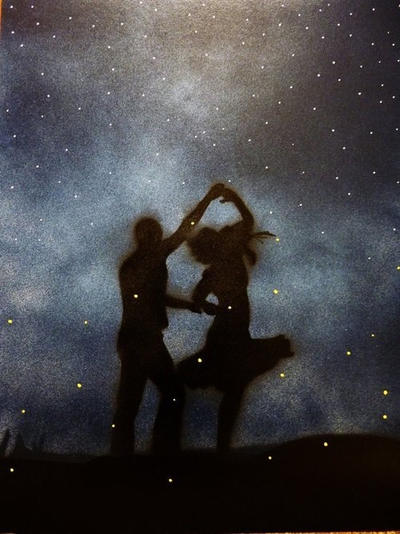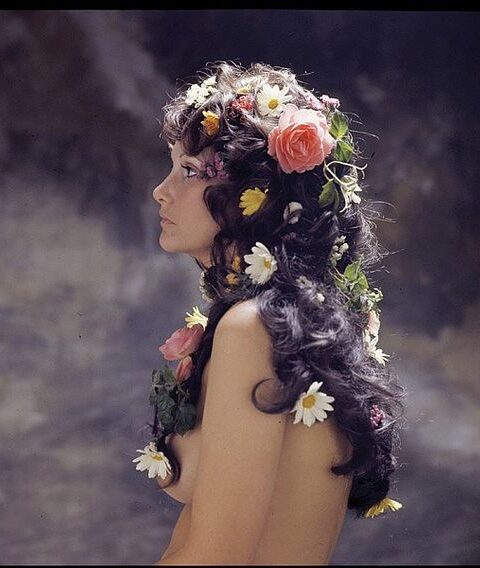
Moon-Saturn Synastry Aspects: A Lack of Emotional Affinity Between the Two of You?
 Question: Robert Hand says that a Moon and Saturn aspect in synastry is an indication that there is a lack of emotional affinity between the two of you. You may be able to work together as business associates on various projects and even be quite friendly. But you are not likely to have the in-depth understanding needed for a deep personal friendship or love relationship. In a close personal association, this aspect is likely to produce a sense of emotional alienation, as if you cannot quite get into each other. The close warmth and togetherness that is basic to such a relationship is just not there.
Question: Robert Hand says that a Moon and Saturn aspect in synastry is an indication that there is a lack of emotional affinity between the two of you. You may be able to work together as business associates on various projects and even be quite friendly. But you are not likely to have the in-depth understanding needed for a deep personal friendship or love relationship. In a close personal association, this aspect is likely to produce a sense of emotional alienation, as if you cannot quite get into each other. The close warmth and togetherness that is basic to such a relationship is just not there.
An emotional relationship may survive for a long time in spite of this aspect, but it will not be completely satisfying, and you may feel lonely with each other. In addition, the depressive effects of this contact may cause you to overemphasize the difficulties you actually face. If you both feel that you need the relationship for personal growth, by all means pursue it. But you should modify your expectations for deep satisfaction on the emotional level. What are your thoughts?
Now, it’s easy to read this astrological insight and feel like you’ve just had the wind knocked out of your emotional sails. But, as with all things written in the stars, there’s more to this than just a black-and-white declaration of doom. Yes, the Moon-Saturn combination might not promise the effortless emotional rapport that we’re told is the hallmark of true love. But, and this is an important but, relationships aren’t just built on the easy bits. Sometimes, they’re forged through challenges, where the lack of instant emotional affinity makes way for a different kind of connection—a connection based on growth, mutual respect, and the kind of loyalty that’s not swayed by the whims of a single, fleeting moment.
Sure, it might not be the warm, fuzzy hug of a Moon-Venus trine, but it can be the disciplined, steady hand that builds something solid, something enduring. Saturn isn’t here to rain on your parade; he’s here to build you a sturdy, all-weather shelter. You might feel a certain emotional distance, but, if you lean into the relationship with eyes wide open, understanding that it might require more conscious effort, you can find satisfaction in the deep, slow burn of commitment rather than the flash-in-the-pan of instant chemistry. You might have to redefine what emotional fulfillment means to you.
In a Moon-Saturn synastry contact whether it’s a conjunction, square, or opposition, one’s all emotion, flow, and intuition, while the other’s all structure, boundaries, and a bit serious. The Moon, with its deep wells of feeling, is like a sponge, soaking up the emotional atmosphere. It craves connection, nurturance, and the freedom to express all the messy, tender feelings that bubble up from within. Enter Saturn, who, while vulnerable underneath it all, tends to respond to all this raw emotion with a less than enthusiastic response. But let’s not rush to despair. This is not the tale of a doomed relationship. Saturn’s fear, vulnerability, and awkwardness in the face of the Moon’s emotionality are not signs of a lack of caring but rather a deep concern for safety, both emotional and otherwise. Saturn might envy the Moon’s ability to feel so freely and might even react by trying to impose order on what feels like chaos. The Moon, sensitive as it is, might feel this as criticism, a shutting down, and retreat into a shell like a wounded child.
It’s easy to see how it might lead to feelings of frustration and emotional alienation. The Moon, with its instinctual desire to care and nurture, might find itself drawn to Saturn’s vulnerability, even if it’s hidden behind layers of armor. Saturn, despite its initial rigidity, may secretly crave the Moon’s warmth and responsiveness—though it might express this craving by trying to control or contain the Moon’s emotional expression. If mishandled, it can lead to resentment. The Moon might feel criticized or confined, while Saturn might feel overwhelmed by emotions it doesn’t quite know how to handle, reacting with coldness or withdrawal. Saturn’s influence, though it may seem harsh, is also about protection and stability. It can offer the Moon a sense of security, grounding those emotions and providing a safe container for them. The Moon, in turn, can teach Saturn to open up, to feel more deeply, and to express vulnerability not as a weakness, but as a pathway to genuine connection. It’s a relationship that may require patience, a willingness to understand and respect each other’s differences. The Moon will need to express its feelings without fear of judgment, while Saturn will need to soften its approach, learning to respond with empathy. So, while this might not be the easiest astrological match, it’s one that holds the potential for a lasting connection.
Saturn, for all its reserve, is not cold-hearted. It’s just a little cautious, a little afraid of being swept away by feelings it doesn’t quite know how to handle. If Saturn can recognize that the Moon’s emotional needs aren’t a threat but rather an invitation to deeper intimacy, then Saturn can begin to let down its guard, even if just a little, and allow for some of that fluid, responsive love to seep in. It’s about meeting each other halfway—Saturn learning to loosen the reins, and the Moon learning to respect the need for boundaries.
Together, these two energies can create a bond that’s built not just on romantic idealism but on something far sturdier—mutual respect, emotional fidelity, and the understanding that true intimacy involves both vulnerability and strength. It’s not an easy path, but then, the best things in life rarely are. So, if you find yourself in a Moon-Saturn connection, know that with patience, understanding, and a bit of emotional heavy lifting, you can build something that lasts, something that weathers the storms and stands firm, even when the winds of life start to howl.
The dynamic here is rich with tension, a sort of emotional tug-of-war where each side seems to unknowingly push the other’s most tender buttons. Saturn, brings wisdom, yes, but also a critical eye, shaped by its own past experiences—often unpleasant, often harsh. Saturn’s past is like a heavy backpack filled with the stones of childhood lessons, parental expectations, and perhaps even generational trauma. So when the Moon comes along, all fluid and instinctual, living in a world of feelings and unconscious impulses, Saturn reacts defensively. The Moon’s very presence stirs up something uncomfortable in Saturn, a reminder of vulnerabilities and wounds that Saturn would rather keep under wraps.
The Moon, symbolizing the unconscious and the primal self, is all about instinct and reaction. It operates on a level that’s less about reason and more about raw emotion. It doesn’t plan or defend; it feels and reacts, often pulling from the deep well of past experiences that are so ingrained they’ve become instinctual. When the Moon encounters Saturn’s harsh nature or coldness, it’s like a child being scolded by a disapproving parent—deeply hurt, confused, and increasingly self-conscious. What makes this interaction particularly poignant is that both the Moon and Saturn are, in their own ways, dealing with the past. The Moon is like an old family photo album, filled with memories and emotions that are worn on its sleeve. Saturn, on the other hand, is more like a locked drawer, where painful experiences are kept hidden away, unexamined but still very much present. The Moon’s natural tendency to cling to feelings, even those that are troubling to Saturn, only exacerbates this tension. Saturn sees the Moon’s emotional needs as a threat, a disruption to its carefully constructed defenses.
In relationships, this can lead to a subtle, almost insidious cycle. The Moon’s instincts and habits, even those that seem insignificant, can trigger Saturn’s deepest insecurities. Saturn might respond with criticisms or withdrawal, which only deepens the Moon’s sense of inadequacy and hurt. The more the Moon tries to connect on an emotional level, the more Saturn might feel the need to protect itself, resulting in a push-pull dynamic where neither party feels truly understood or accepted. But here’s the thing—this dynamic, challenging as it is, can also be a powerful opportunity for growth. If Saturn can learn to recognize that its irritation is often a projection of its own unresolved issues, it can begin to approach the Moon’s emotional world with more compassion and less judgment. And if the Moon can understand that Saturn’s criticism is often a defense mechanism rather than a true reflection of its worth, it can start to take Saturn’s wisdom without internalizing the harshness.
This relationship requires both parties to step outside their comfort zones. Saturn needs to soften, to allow vulnerability to surface without immediately clamping down on it. The Moon needs to develop a thicker skin, recognizing that not every criticism is a personal attack but sometimes a reflection of Saturn’s own struggles. The Moon, representing the private, instinctual self, is like the soft underbelly of a person’s emotional world. When another person’s planet makes contact with the Moon, it often feels like someone has reached out and touched that tender, hidden part of you, giving it permission to come out and play. But when Saturn’s energy enters the picture, that tender part of the Moon feels less like it’s being invited out and more like it’s being scrutinized under a harsh, fluorescent light.
Saturn, with its need for control and fear of vulnerability, doesn’t approach the Moon with open arms. Instead, Saturn tends to overlay its interactions with the Moon with a heavy dose of projection. It’s as if Saturn, deeply afraid of its own emotional needs, sees in the Moon’s openness something both compelling and terrifying. There’s an understanding, but it’s tinged with a kind of discomfort—an unspoken fear that the Moon’s vulnerability might expose Saturn’s own insecurities.
Saturn, in an attempt to protect itself, may become critical, nagging, or even subtly undermining. It’s a defense mechanism, a way for Saturn to keep the Moon at a safe distance while still, paradoxically, trying to pull the Moon closer. Saturn’s critical nature can be seen as an attempt to mold or control the Moon, perhaps to ensure that the Moon remains emotionally loyal. But this criticism, even if it’s rooted in an unacknowledged longing, often feels like a rejection to the Moon, leading to feelings of embarrassment, inadequacy, and hurt. The Moon, sensitive and reactive, may feel discouraged by Saturn’s cool exterior, perceiving it as disapproval. Yet, beneath Saturn’s stony façade lies a deep emotional needfulness—a need that Saturn is often reluctant to acknowledge, let alone express. This unexpressed need creates a push-pull dynamic where the Moon might sense that Saturn’s coldness is masking something much deeper, but isn’t quite sure how to respond to it.
The emotional needfulness that exists in this contact isn’t inherently negative. In fact, it can be the very thing that drives both individuals toward a deeper, more meaningful connection. If the Moon can understand that Saturn’s negativity often comes from a place of fear rather than genuine disapproval, it might find a way to offer the warmth and security that Saturn craves but is too afraid to ask for. On the other hand, if Saturn can muster the courage to lower its defenses, even just a little, it might find that the Moon’s emotional openness isn’t something to fear, but rather something that can offer healing and intimacy.
Here we have a pairing that, despite its challenges, is heavy, enduring, and capable of withstanding the test of time. It’s not the kind of connection that sweeps you off your feet in a whirlwind of passion, but rather the kind that digs in, settles down, and says, “We’re in this for the long run, come what may.” Now, these connections are often accompanied by a certain amount of self-consciousness, inhibition, and the occasional sting of hurt feelings. Saturn, with its ever-watchful eye and tendency toward gloom, can come across as a harsh critic, forever finding fault in the Moon’s seemingly irrational behavior. The Moon, on the other hand, is all instinct and emotion, acting out of a deeply embedded, often unconscious, need to express and feel. When these two energies collide, it’s a game of tug-of-war where both sides end up feeling bruised and misunderstood.
According to Liz Greene, Saturn might see the Moon’s habits—those little quirks and emotional responses—as irrational and, in its desire for order, might pick at these habits like an editor with a red pen. The Moon, however, is just being itself, doing what it’s always done, because that’s how it’s wired. This can lead to feelings of being “picked at” or criticized for things that, to the Moon, are as natural as breathing. It’s akin to asking a river why it flows or a bird why it sings—there’s no logical explanation; it just is. But despite the nagging, the discontent, and the occasional grey clouds that gather in the emotional sky, Moon-Saturn contacts often point to something much deeper and more enduring. They suggest a connection that, if both parties are willing to do the work, can lead to a deeper understanding and a bond that is nearly unbreakable.
Both the Moon and Saturn are connected to the unconscious mind, meaning they have the ability to tap into each other’s deepest, most private inner worlds. This is not a connection that’s built on superficial charm or a fleeting attraction; it’s built on the raw, often unpolished realities of who we are at our core. When two people with this connection manage to wade through the murkiness of hurt feelings and misunderstandings, they can find themselves with a relationship that’s as solid as a rock.
What’s required here is mutual cooperation—a willingness to see past the immediate frustrations and to understand that the criticisms and hurtful comments are often symptoms of deeper fears and insecurities. Saturn needs to recognize that its tendency to criticize is often a way of protecting itself from feeling vulnerable, and the Moon needs to understand that its emotional responses aren’t irrational, but simply part of its nature. If both individuals can approach each other with compassion, they can create a bond that not only endures but also grows stronger over time. This bond can provide a sense of emotional security and stability that’s rare in relationships, the kind of connection that’s built on the deep, steady foundation of mutual understanding and respect. Moon-Saturn connections may not always be easy, but they offer something invaluable—a relationship that’s capable of weathering the storms of life, providing both partners with a sense of solidity and emotional grounding.



















 Scorpio’s Cold Withdrawal
Scorpio’s Cold Withdrawal
 Moon Conjunct Pluto Synastry
Moon Conjunct Pluto Synastry
 Venus-Pluto Synastry: A Love So Powerful That It Might Just Kill Them
Venus-Pluto Synastry: A Love So Powerful That It Might Just Kill Them
 Mars Square Pluto Natal Aspect: The Unbreakable Spirit
Mars Square Pluto Natal Aspect: The Unbreakable Spirit
 Reflections on a Past Venus-Pluto Synastry Aspect
Reflections on a Past Venus-Pluto Synastry Aspect
 Mercury Conjunct Venus Synastry
Mercury Conjunct Venus Synastry
 Mars-Pluto Synastry: Something Quite Dark and Dangerous
Mars-Pluto Synastry: Something Quite Dark and Dangerous
 Uranus Transits 8th the House: Rebirth from Chaos
Uranus Transits 8th the House: Rebirth from Chaos
 Venus Trine Mars Synastry
Venus Trine Mars Synastry
 Mars-Saturn Synastry: The Eternal Loop
Mars-Saturn Synastry: The Eternal Loop
 Composite Sun in the 8th House: Weather the Storm
Composite Sun in the 8th House: Weather the Storm
 Sun Conjunct Pluto Synastry: Enlightening or Annihilating
Sun Conjunct Pluto Synastry: Enlightening or Annihilating
 Mars in Aquarius: Sex drive
Mars in Aquarius: Sex drive
 Venus Trine Pluto: Dark Desires
Venus Trine Pluto: Dark Desires
 Mars Conjunct Pluto Synastry
Mars Conjunct Pluto Synastry
 Moon Opposite Uranus Natal Aspect
Moon Opposite Uranus Natal Aspect
 The Watery Gardeners: Cancer, Scorpio, and Pisces
The Watery Gardeners: Cancer, Scorpio, and Pisces
 Transiting Pluto Aspect Natal Mars: Are You Mad as Hell
Transiting Pluto Aspect Natal Mars: Are You Mad as Hell
 Moon Conjunct Pluto Natal Aspect: Emotional X-Ray Vision – Seeing Through Souls Since Birth
Moon Conjunct Pluto Natal Aspect: Emotional X-Ray Vision – Seeing Through Souls Since Birth